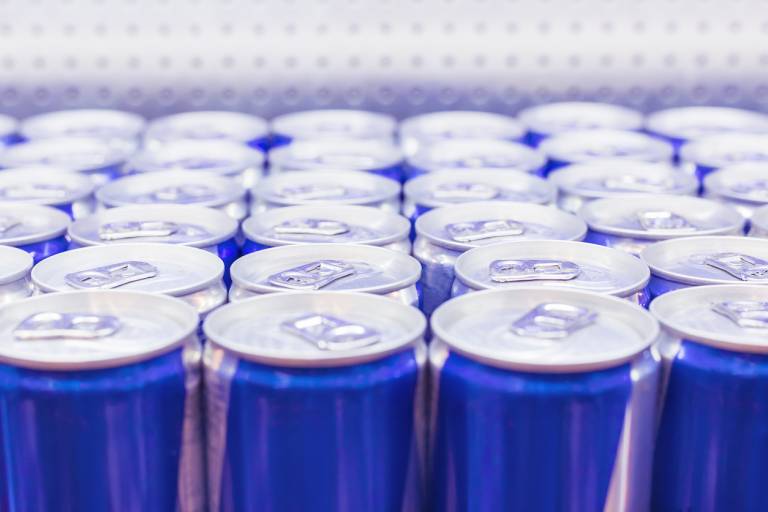Up to a third of children in the UK drink energy drinks weekly
15 February 2022
Up to half of children worldwide, and up to a third of children in the UK, consume energy drinks every week, finds research led by UCL and the University of York.

The study, published in the BMJ Open, found evidence that children who drank energy drinks on five or more days per week were likely to have low psychological, physical, educational and overall well-being such as headaches, sleep problems, alcohol use, smoking, irritability and school exclusion.
The authors say that although the data supports the idea that there is a link between drinking caffeinated energy drinks and poorer health and behaviour in children, the direction of effect is unclear, and that the evidence must be interpreted with caution.
The study analysed data on thousands of UK children, in addition to reviewing evidence on children’s consumption of energy drinks from around the world. The findings suggest that boys drink more than girls, and that in the UK, more socio-economically disadvantaged children from the North of England drink more than any other group
Co-author Dr Dylan Kneale (UCL Social Research Institute) said: “Our research suggests that boys and children with a more disadvantaged social profile are more likely to consume energy drinks, and that children who consume energy drinks appear to have poorer health.
However, studies with a more robust design are needed in order understand if consumption of energy drinks causes poorer health or is simply a marker of poorer health status and social disadvantage.”
An average 250 ml energy drink contains a similar amount of caffeine to a 60 ml espresso. The European Food Safety Authority proposes a safe level of 3 mg of caffeine per kg of body weight per day for children and adolescents. Many energy drinks also contain other potentially active ingredients, such as guarana and taurine, and more sugar than other soft drinks.
Lead author of the paper, Claire Khouja, from the Centre for Reviews and Dissemination, University of York, said: “While more research is needed to track the effects of energy drinks on children who drink them, our research has uncovered consistent evidence of links between the regular consumption of these drinks and harmful effects on children’s overall wellbeing."
In 2018, the UK government ran a consultation on banning the sale of these drinks to children, but as only two UK studies were identified among the available evidence, additional UK data was sought, and a secondary analysis of relevant data was carried out to ensure relevance to UK policy. Following this consultation, of which the study is part, in July 2019 the Government announced plans to intoduce a ban on energy drink sales to children.
For this review, the researchers wanted to find out what type and how many energy drinks UK teens were getting through as well as exploring the potential impact on young people’s physical and mental health, and behaviour.
In July 2021 the researchers updated their original trawl of relevant research from 9 databases carried out in May 2018.
Two further systematic reviews were added to the original 13, covering a total of 74 studies, published in English since 2013: 6 of these 15 reviews reported on prevalence and 14 reported on associations between consumption and health or behaviour.
The additional analysis included data representative of the UK or one of the devolved nations, including information on the levels and patterns of energy drink consumption among children and the potential effects on cardiovascular health, mental health, neurological conditions, academic achievement, substance misuse, or sleep.
The systematic review data revealed that, worldwide, between 13% and 67% of children had consumed energy drinks in the preceding year. UK data indicated that between 3% and 32% of children across the UK consumed energy drinks on at least one day of the week, with no difference by ethnic background.
The study was carried out by NIHR Policy Research Programme Reviews Facility, a collaboration between UCL, the University of York, and the London School of Hygiene & Tropical Medicine.
Links
- UCL Social Research Institute
- Dr Dylan Kneale's academic profile
- NIHR Policy Resarch
- Paper in the BMJ
- UCL Institute of Education
Image
- iStock images "Cans with energy drink" CC BY 2.0
Media Contact
Rowan Walker
Tel: +44 (0)20 3108 8515
Email: rowan.walker [at] ucl.ac.uk
 Close
Close

